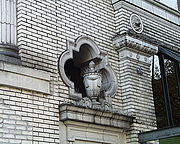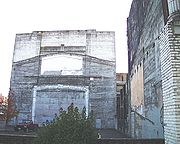
Capitol Theater (Salem, Oregon)
Encyclopedia


Salem, Oregon
Salem is the capital of the U.S. state of Oregon, and the county seat of Marion County. It is located in the center of the Willamette Valley alongside the Willamette River, which runs north through the city. The river forms the boundary between Marion and Polk counties, and the city neighborhood...
, Oregon
Oregon
Oregon is a state in the Pacific Northwest region of the United States. It is located on the Pacific coast, with Washington to the north, California to the south, Nevada on the southeast and Idaho to the east. The Columbia and Snake rivers delineate much of Oregon's northern and eastern...
, United States
United States
The United States of America is a federal constitutional republic comprising fifty states and a federal district...
. It was built in the 1920s for vaudeville
Vaudeville
Vaudeville was a theatrical genre of variety entertainment in the United States and Canada from the early 1880s until the early 1930s. Each performance was made up of a series of separate, unrelated acts grouped together on a common bill...
. During its heyday, it housed a Wurlitzer
Wurlitzer
The Rudolph Wurlitzer Company, usually referred to simply as Wurlitzer, was an American company that produced stringed instruments, woodwinds, brass instruments, theatre organs, band organs, orchestrions, electronic organs, electric pianos and jukeboxes....
pipe organ
Pipe organ
The pipe organ is a musical instrument that produces sound by driving pressurized air through pipes selected via a keyboard. Because each organ pipe produces a single pitch, the pipes are provided in sets called ranks, each of which has a common timbre and volume throughout the keyboard compass...
, which is now in private ownership in Washington.
Decline and demolition
The theater converted from vaudeville to movies. By the 1980s, it was one of only two pre-World War IIWorld War II
World War II, or the Second World War , was a global conflict lasting from 1939 to 1945, involving most of the world's nations—including all of the great powers—eventually forming two opposing military alliances: the Allies and the Axis...
theaters left in downtown Salem, which had once hosted as many as eight. Like its neighbor, the Elsinore Theatre
Elsinore Theatre
The Elsinore Theatre is a theatre located in Salem, Oregon, United States, that first opened on May 28, 1926.- Construction and early years :...
, the Capitol declined to a second-run movie house. It housed Salem's only surviving newsstand, complete with a cigar store Indian
Cigar store Indian
The cigar store Indian or wooden Indian is an advertisement figure, in the likeness of an American Indian, made to represent tobacconists, much like: barber poles advertise barber shops; Show globe for an apothecary; or the three gold balls of the pawn shop. The figures are often three-dimensional...
out front, until the theater closed in the early 1990s.
In 1994, the Capitol Theater was included in a plan to restore the neighboring Elsinore Theatre that never materialized.
The Capitol Theater was demolished in May/June 2000 because of structural decay. The location is now a parking lot, however, the adjoining office and retail space remains. This retail building, known as the Bligh Building and currently as the Pacific Building, is a contributing property
Contributing property
In the law regulating historic districts in the United States, a contributing resource or contributing property is any building, structure, or object which adds to the historical integrity or architectural qualities that make the historic district, listed locally or federally, significant...
of the Salem Downtown State Street-Commercial Street Historic District, which is listed on the National Register of Historic Places
National Register of Historic Places
The National Register of Historic Places is the United States government's official list of districts, sites, buildings, structures, and objects deemed worthy of preservation...
.
External links
- Capitol Theater from Cinema Treasures
- Historic images of Capitol Theater from Salem Public Library
- Image of Capitol Theater from 1999 from Salemoregon.com

